PTSD: When They Come Home "Different"
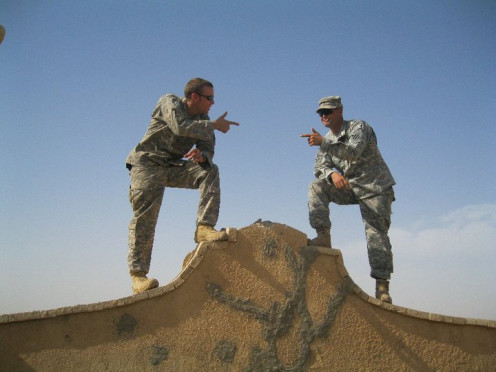
Preperation for a Teen's Father Coming Home from War
My father was an officer in the United States Navy. We were under the "impression" he was an intelligence officer. He had a security clearance I knew and he couldn't tell us where he was going or when he would be back and that was my childhood but my father never changed from my recollection until he got out of the military but we still didn't really see him. After his job was unclassified years later we found out he was working for the NRO; so that explained all the business trips he went on when we thought he was a male secretary. I didn't really see anyone come home different until my second husband and he was diagnosed with Post Traumatic Stress Disorder; I can't imagine being a teenager and fully understanding what is going on in the house or the marriage or the family dynamics and not being grown enough to have any say in what goes on after.
Many service members are coming home from places like Afghanistan and Iraq. It is a bittersweet moment I personally have experienced having a soldier crossing the gym or the parade field in their ACU's and their face so familiar but yet so much a stranger stands before you. You cry because you are happy they made it home to you safe; that all the fear you lived for twelve to fifteen months (and some cases up to eighteen).
The family as well as the soldier's have unrealistic ideals of what it will be like; some go so far as say "a second honeymoon". Others act as if the things that were said and done during the deployment aren't going to matter anymore but everything doesn't just disappear. Problems you had before deployment are still there and magnified by the problems you may have had during the deployment. Where do the teenagers fit in when they are old enough to know and understand what has been said and done but yet they don't have the rights as adults to say what they want or how they want? Are teenagers shown enough of the attention and interaction and communication they need when their father or mother returns from war; especially if they aren't the same anymore? Do they suffer emotionally and mentally because of a parent suffereing from post traumatic stress disorder?
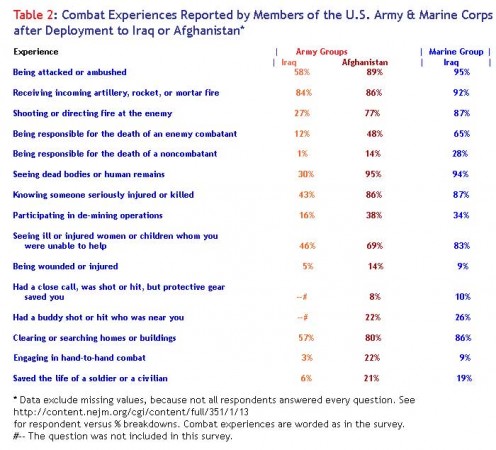
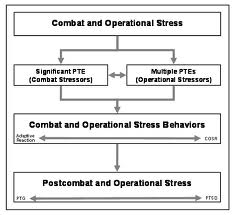
PTSD AND MENTAL ILLNESS MORE COMMON THAN KNOWN
Rates around PTSD are more common among those that have experienced combat; especially if they have repeatedly been deployed in combat areas. Other problems may develop that they didn't previously suffer such as alcohol consumption where approximately 25% admit to using more alcohol then they intend and had prior to deployment consumed. It is a scary time for some teenagers as they recognize the changes in their parent and the family dynamics. It can also be confusing for them as they struggle with their own emotions. Common questions arise for those that have a parent return from war diagnosed with PTSD:
They ask:
- What is this all about?
- Why is it happening to me?
- How do I survive amid this confusion?
- What do I tell my friends?
- How can I make my parent better?
They are commonly left with a higher risk of developing their own emotional or behavioral problems.
Common reactions of family members
1-Sympathy
You may feel sorry for your loved one's suffering. It can help with your spouse or father see that you sympathize but you need to be careful that you don't overwhelm them with your concern and smother them as a mother hen might do. It may cause resentment and make them feel that they are being treated like they are an invalid.
PTSD can make someone seem like a different person. If they refuse treatment or acknowledge their problems or that they have PTSD and follow their treatment plans it can be difficult to see past the situation and understand its not your fault. It begins to maybe feel it is and you can resent them and be hurt emotionally by their behavior; especially if you don't understand it. Teenagers may not feel they have anyone to talk to and ask questions regarding the disorder and don't want to involve anyone for fear that others will judge them or their parent who did fight in a war. Teenagers as their family; should educate themselves about PTSD and find ways to cope as a family and to have open communication in regards to their feelings to that they not only can help their loved one but each other.
Avoidance
Avoidance is one of the symptoms of PTSD. Those with PTSD avoid situations and reminders of their trauma. Family members begin to avoid as well and it can cause a gap in the relationships between the person with PTSD and the other family members. If you are supposed to attend a function and the member with PTSD doesn't want to attend. Let them stay home if they wish and don't make a scene about it and accept that things are hard for them. IF however; safety of yourself and other family members is an issue seek immediate intervention and help. Avoidance with children and their teenagers is common as I have seen it a huge issue for my exhusband and my kids. Its harder the younger they are but I think that it was getting better when they wouldn't demand a lot of their father. If he was playing his game on the PC they would sit next to him with their DS. They weren't talking or interacting but my husband felt their acceptance of his incapability at the moment to be the father they needed. It was me that had the problem and pushed it to the brink but the kids adapted on their own. Teenagers can read them better and should find ways to be their without intruding on the parent that may be suffereing. Sometimes their presecence opens the door to more interaction and maybe conversation about how the parent is coping.
Depression
This is common among family members when the person with PTSD causes feelings of pain or loss. When PTSD lasts for a long time, you may begin to lose hope that your family will ever "get back to normal."
Anger and guilt
If you feel responsible for your family member's happiness, you might feel guilty when you can't make a difference. You could also be angry if he or she can't keep a job or drinks too much, or because he or she is angry or irritable. You and your loved one must get past this anger and guilt by understanding that the feelings are no one's fault.
Anger will also build up over time if their isn't a way to release it in a positive way. Anger shouldn't be directed at each other though it commonly is and the anger may have nothing to do with the other party. Teenager's are more emotionally vulnerable and should use their friends as way of letting off steam while their friends should have a little knowledge of PTSD so as to help rationalize that anger. In many situations I recommened a family therapist and individual therapy for the kids and teens plus utilizing support groupls and teen groups in the community and also on post so that they don't feel alone. They have a constructive environment with positive feedback and influences. The parent doesn't need to accept they need help for the rest of the family to accept they need help dealing with PTSD.
Health problems
Everyone's bad habits, such as drinking, smoking, and not exercising, can get worse when trying to cope with their family member's PTSD symptoms. You may also develop other health problems when you're constantly worried, angry, or depressed.
Summary
Family members may feel hurt, alienated, or discouraged because your loved one has not been able to overcome the effects of the trauma. Family members frequently devote themselves totally to those they care for and, in the process, neglect their own needs.
Social support is extremely important for preventing and helping with PTSD. It is important for family members to take care of themselves; both for their own good and to help the person dealing with PTSD.
The military community provides many resources to help loved one's with PTSD as well as the service member. Some posts are very good at keeping awareness and intervention in the public ear and other's aren't so good. Fort Stewart is recognized as one of the best for their awareness yet they are the worst and I could go on forever about that but the important thing is to also use your community. I can provide people with post specific and community specific information if you are needing further assistance. Please contact me and I will keep it confidential.
"I Can't Fix Him"
It is not our responsibility as spouse's (and definitely not children) to fix our family member with PTSD. It is ingrained in us military spouse's to support them, to become everything and everyone, while they are gone. We become the one's that are supposed to understand and support and be there when no one else is. The Army I have found is the hardest to be a wife of a military service member. At least in my own experience to find someone that will listen to you and not just ignore your begging and pleading to help your family get through a time when war has controlled half of the life with them gone and the other half helping them cope being home. It isn't about normal living for us its about surviving.
His wife, Selina, said, "He was angry at the world. He wasn't angry at the children. He was very angry and depressed, but he didn't let the kids see that.... They only saw their fun-loving dad who likes to give horsey rides. [But] I saw it. My demands were, 'Either you fix it -- 'cause it's got to change -- or we'll have to discuss living arrangements.' "
It was the same for me and my family. The kids were pretty clueless but I wasn't. I was used to him helping in little ways that he didn't anymore. Shopping with me instead of handing over a debit card only for me to have been the one at fault when we didn't have enough money. If I tried to talk to him about it and we ended up fighting every time; it was either I fix it or we get a divorce. It was always something I had to fix. I hated talk of divorce because I knew if he would finally get it through his thick head we needed therapy we would be okay. We both had to want it though for it to work and that wasn't happening. I wanted to change him, I wanted to change the fact we PCS'd to Georgia (though it would probably have come to this no matter where we were), I wanted to just change him BACK.
"I can't fix him. I support him, but I can't fix it," she said. "And I have chosen not to be burdened with his knowledge, just for my own mental health. I don't need to know those things. And I know that sounds like a horrible thing to say aloud and to try to explain to somebody, but I deal with the day to day and making sure the kids are happy."
I tried to support my husband and I did until the very last minute. I still in a lot of ways do though he let our divorce go through. I let my own mental health suffer. I didn't know anything he went through and as though she needed to not know I needed to know something. I didn't understand because I didn't know what he went through. I was shocked when I read his file because it stated he had been in an incident I knew nothing about the second tour in Iraq. He said it was uneventful. I didn't know until way later he had passed out of shock from a work accident and in the hospital for three days. No one told me. I heard the grapevine he was on suicide watch and no one still has yet informed me if he is even alive though no I guess; as an ex-wife, I am not of any "need to know" but it scares me.
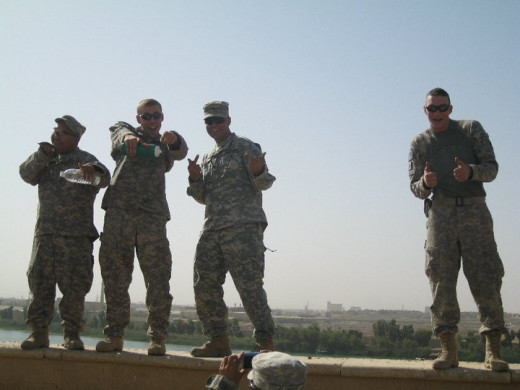
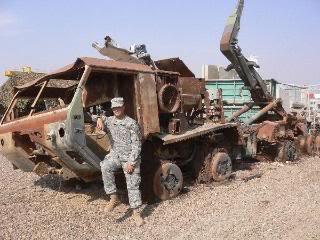
Spouses suffer PTSD
We don't suffer the same way the soldier's do when they deploy; and its not something anyone really understands or recognizes half the time. We do suffer though; and many in different ways. I know this from first hand experience and one I am finally able to share as for me, it was embarrassing to admit I wasn't able to handle it and be the wife I wanted to be
Dawn Phillips, an Army wife of 30 years, was on the phone with her husband, who was stationed in Baghdad's Green Zone, when "it dawned on me that the noise in the background was a rocket coming in," she said. "The last thing I heard was BOOM, and the phone went dead. I just fell down on the floor sobbing," she recalled. "I thought he was gone. Twenty minutes later, he was able to get a call through, and I still couldn't quit sobbing."
I have been through three deployments in some respect and hated every single one of them. None of them went smoothly; if there is such a thing. I understand what she is saying because I have been on the phone when my first husband said "Hey gotta go, mortar just hit". I have been sitting around through black out after black out ( communication shut down because of a casualty and until the family is notified they cut off lines of communications ). I have wondered if it was my husband; if it was a friend of mine's husband. I have sat on the floor begging for my expensive calls to Iraq to my first husband's cell phone to go through. I have sat and begged yahoo to let me see my loved one sign on. I have gone weeks without hearing anything. It is living an intense fear of the worst every day.
Even after David Phillips returned, he had to travel so frequently for work -- what the military calls temporary duty, or TDY -- that she was often alone, having sent their youngest child off to college. "I was crying a lot, still, all the time, and while he was gone TDY, I contemplated suicide," Phillips said. "I went out and stood up on the back porch and looked over and thought, 'Damn, if I jump, I'm just going to break my arm or leg, and it's not going to do anything.' "
David Phillips, now a brigadier general, has cut back on his travel. "I truly believe in my heart that family members, spouses, suffer PTSD," he said. "We need to address them too."
I was in Fort Hood, Texas where my first husband and I had moved with our three children while undergoing the evaluation for my second child for Autism. We were married a total of 8 years when our divorce was final. I had been a Marine wife and loved every minute of it and I was a good military wife. I also worked hard at my own education and career and supported his as well. I knew everything and more and I strive to "hold it together" whenever he was gone. I had never been through a year deployment though, and I was scared to death. I had tried to be busy and stay involved and became FRG leader and I would never recommend that to anyone no matter how much they say its beneficial; its a breeding ground for miserable wives who gossip and let themselves be hurtful to others and its nothing I will ever be a part of again. Not saying all are that way but mine was.
I was put on Paxil prior to deployment. My husband noticed I was not doing okay and he said he was worried about leaving me with the kids and especially my son with Autism as I couldn't handle it while he worked long hours. 4th Infantry Division had them working from PT to late into the night and sometimes he didn't come home; having to sleep in his car for PT the next day due to one of his soldier's domestic issues again. I missed my best friend and my husband who did literally half of everything. I had already been diagnosed with PTSD when my little sister died at 15 years old and I didn't deal with any situation where the outcome could be death very well at all. Not to mention he was half of my life literally. We had a good marriage but it wasn't perfect and we divorced almost a few times but what held us together was we were best friends and we had been through everything together.
I remember kissing him the last time right before getting on the white bus that took him away from me. I couldn't cry. The Paxil made me feel numb so I thought there was something wrong with me. I didn't see how bad I was taking it. I wanted to hold onto him forever but I was also trying to put on this brave front and show that I wasn't going to collapse because I was an NCO wife and the FRG leader and already had wives and families collapsing around me. I had one that had to be restrained she kept trying to run to the buses and I just was numb. I told him nothing else mattered from before just here and now and that he came home to me. I promised I would be there for him and I lied. I fell apart and divorced him while he was in Iraq and I destroyed who he was. I had PTSD and I had other issues and no one cared and no one noticed enough to help me.
I was not taking it well to the point I was just collapsing in anxiety attacks, I resigned as FRG leader two months into deployment. My psychiatrist thought I was Bipolar and misdiagnosed me and put me on Depakote of 1400mg a day and Paxil as well. Added Xanax. Nothing worked. I ended up feeling odd, acting odd, and didn't know I was not myself. I tried talking to the doctor and the doctor threatened to commit me for arguing with him and I instead took my kids to their grandmother's in California. They didn't care about my mental stability and they sat and judged me, they wouldn't always let me talk to my kids, the changed around their birthday parties so I couldn't attend, they lied to me about what the kids were doing and how they were doing and that sent me into clinical depression.
My husband and I fought one day three months into deployment and I filed for divorce, got a boyfriend who ended up abusing me, my parents didn't talk to me anymore and my sister accused me of doing illegal drugs. I begged my mother to come and help me and in a way I guess I wanted to be committed but didn't know how to ask for it. She said no because her Elk's lodge was more important. My husband called and begged my psychiatrist to help me and said there was something wrong with his wife; she wouldn't file divorce, she wouldn't be doing half of what she is doing but the doctor told him I was fine. I was medicated. I was far from fine.
My so called friends knew I was off my rocker and instead of helping me there was blog wars, slander, their was websites dedicated to what horrible person I was. My rapes in the past were put up for all too see. They made up accounts to befriend me and then turned around and made that public too. I tried to move and my address and number was purchased through a background check service on the Internet. I was harassed and my mental health was worse and worse. My husband signed the papers and didn't fight the divorce. I think he thought its what I wanted and when he came home he was too hurt to see how much I needed help. It took five years and another divorce for me to get better and I still struggle. I snapped. I don't want that to happen to anyone but I saw it happen here at Stewart and even though I tried to help her I couldn't. I guess we all just will go through what we need to go through but I can't be an Army wife right now. Its made me suffer worse then I had to. PTSD is what I live with every day and I have to accept my own illness before I would be any good to someone else yet my second husband suffers from it and can't accept it. I can't help him because I needed to help myself.
PTSD in spouses DOES exist. It is a MUCH NEEDED issue to address and help the wives because I know my situation is extreme but it is very real. I had an affair and I never would have. I left my spouse at war and I was morally and ethically against the women that did that. I gave my kids to my in law and I never would do that. I stopped paying bills that I worked eight years on establishing perfect credit. I got into an abusive relationship where I tried killing myself on several occasions and I am not suicidal. I hate to say and admit what happened to me because its a part of my life for a long time I wanted back. I wanted my best friend back. For that white bus to never have taken my husband away. I want to go back to when I knew who I was and what I was about but I can't. Living with those actions when I wasn't myself is another issue altogether and no one should live like that. The army refused to help me, refused to help my husband and my family; twice now. Three Army posts later and the only one that gave a hoot was Germany. I hope that by telling what actuality is people will see that its an important issue and needs to be addressed. The rate of divorce doesn't need to be that high; nor the infidelity or abuse rate. The fact is both soldier and spouse have PTSD. Fact is the Army needs to do a whole lot more about it and stop making news sounds like they are on top of it when they just had a unit come back 90 percent of them divorced because the units are encouraging it.
In the DSM-IV, the official handbook of the psychiatric profession, the triggers of post-traumatic stress disorder include "learning about unexpected or violent death, serious harm, or threat of death or injury experienced by a family member or other close associate." Given the constant "threat of death or injury" in the war zone, almost any deployed service member's loved ones can meet that criterion.
This content was accurate and true to the best of the author’s knowledge at the time of publication but may be out of date. The information contained in this article may not reflect current policies, laws, technology, or data.
© 2011 Abby Rourk









